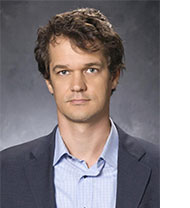 Name: Jason A. Cade
Name: Jason A. Cade
Title: Assistant Professor of Law
Courses: Immigration Law, Community Health Law Partnership Clinic
Hometown: Celo, North Carolina
Law school / graduation year: Brooklyn Law School / 2005
Other degree / institution / year: A.B. / University of North Carolina, Chapel Hill / 1997
1. What influenced your decision to go to law school?
While my wife was in law school at UNC-Chapel Hill I became really interested in what she and her friends were studying and working on. At that time I had been playing and teaching music for a number of years. Being a full-time musician was fun, but at that point I was ready to engage with the world in a different way. I had long been passionate about issues of justice and I hoped that by becoming a lawyer I would gain knowledge and tools that I could use to work on those issues effectively.
2. How did you choose your legal specialty?
During law school I was able to experience a variety of legal work, including indigent criminal appeals, civil rights class actions and administrative proceedings in areas like employment and immigration. I found all of it interesting, important and humbling. Ultimately, I decided that representing individuals with immigration issues was the best fit for my skills and personality. After graduating and clerking for a federal judge, I was fortunate to receive a Skadden Fellowship with a nonprofit organization serving immigrant youth, which allowed me to do work I really cared about from the outset of my career.
3. What do you enjoy most about this area of law?
I like the story-telling aspect of practicing immigration law. A good immigration attorney must learn the details of a client's life and then help the client effectively communicate his or her story in a way that is accurate, compelling and legally significant. I am also gratified by helping people, and success in an immigration case usually means you've achieved life-changing results for your client. Figuring out solutions to complex immigration problems appeals to my creative side. Finally, the academic in me is drawn to making sense of the sprawling immigration code and regulations and thinking about the complexities of how we use immigration law to define our national community.
4. What do you enjoy most about your job? What is the most rewarding aspect of being a professor?
Many things. I have wonderful colleagues whose work I respect and whose friendship I value. I love working with students in my clinic, and especially enjoy seeing them gain skills and become sophisticated about what it means to actually practice as a lawyer, including the challenges and rewards that come with taking on responsibility for another person's well-being. I also am grateful that I have a job that allows me to think deeply and write about the laws and institutions that affect the most vulnerable among us. Teaching in the classroom is very rewarding, too. I particularly enjoy discussions with students about how well the goals underlying the immigration system align with the on-the-ground realities of immigration law and procedure.
5. What type of influence do you hope to have on students in your clinic?
One of the goals I have is that my clinic students will learn that "small" advocacy tasks - for example, phone calls, emails or letters to low-level agency officials - can and should be approached with the same thought process and care that they would put into a legal brief. Students should understand the expectations of the relevant audience, find the most persuasive authority and perfect the facts and arguments through practice, revision and collaboration. And then, when the task has been done, reflect on what went well and what could be improved. This process is not merely good practice for "real" lawyering, it reflects the core value that all clients deserve outstanding representation. I'm gratified that my students tend to readily embrace this approach.
6. Are you currently conducting any research? If so, what is its focus?
My research is in the field of immigration law, with a focus on noncitizens who have encountered the criminal justice system. Immigrants and criminal defendants are two of the most disfavored groups in society, so it's particularly interesting to examine how our legal institutions work for persons who fall within both of those groups.
7. What is your favorite thing about living in Athens?
In a nutshell, Athens provides an ideal combination of culture, community and convenience.
8. What do you enjoy doing in your free time? What are your hobbies?
Mostly my non-working hours are spent with my wife and kids. My oldest is a very curious five year old, and it's incredibly joyful to rediscover the world with him. But I do regularly find time to play fiddle and banjo with friends. I have a duo called Hog-eyed Man that performs traditional southern-Appalachian music from the 19th century.
9. How do you stay up to date on legal issues and trends?
The usual ways. Conferences, workshops, CLE programs, professional working groups, email listservs, law reviews, legal blogs, online newspapers, hallway conversations and - it's true - Facebook.
10. What do you consider your greatest accomplishment in life?
In the words of one of my favorite poets, "I have many leather-bound books and my apartment smells of rich mahogany." Except in my case, the books are actually paperbacks, nothing in our house is made of mahogany and the smells (and sounds) are those of sweaty, happy children playing.
